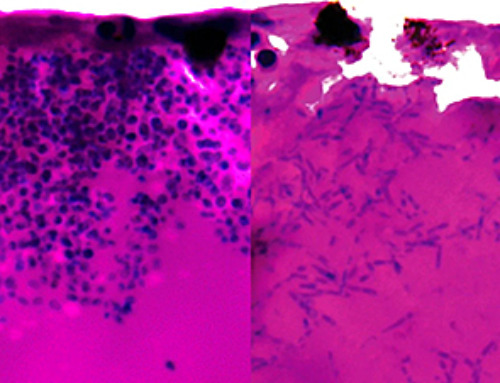MSK researchers discovered that the innate immune system's chronic activation due to issues in the Mre11 complex can lead to cancer, highlighting new therapeutic targets.
In addition to defending against pathogens, the body's innate immune system plays a surprising role in safeguarding genome stability — a function with significant implications for cancer development, as researchers at Memorial Sloan Kettering Cancer Center (MSK) are uncovering.
In a pair of recent papers, scientists in the lab of molecular biologist John Petrini, PhD, showed that innate immune signaling plays a key role in maintaining genome stability during DNA replication. Furthermore, the researchers showed that chronic activation of these immune pathways can contribute to tumor development in a mouse model of breast cancer.
Not only do the findings add vital insights to our understanding of fundamental human biology, says Dr. Petrini, they may also shed new light on tumor initiation and present potential opportunities for new therapies.
"Living organisms have evolved complex pathways to sense, signal, and repair damaged DNA," he says. "Here we're learning new things about the role of the innate immune system in responding to that damage — both in the context of cancer and also in human health more generally."
How Chronic Activation of the Innate Immune System Can Lead to Cancer
The newest paper, led by first author Hexiao Wang, PhD, a postdoctoral fellow in the Petrini Lab, and published in Genes & Development, reveals a connection between innate immune signaling and tumor development in breast tissue. And, Dr. Petrini says, the data suggest that when instability arises in the genome, chronic activation of the innate immune system can greatly increase the chances of developing cancer.
The study focused on a protein complex called the Mre11 complex, which plays a pivotal role in maintaining the stability of the genome by sensing and repairing double-strand breaks in DNA.

To study how problems with the Mre11 complex can lead to cancer, the team manipulated copies of the protein in mammary tissue organoids (miniature lab-grown model organs) and then implanted them into laboratory animals.
When oncogenes (genes known to drive cancer) were activated in these mice, tumors arose about 40% of the time, compared with about 5% in their normal counterparts. And the tumors in the mice with mutant Mre11 organoids were highly aggressive.
The research further showed that the mutant Mre11 led to higher activation of interferon-stimulated genes (ISGs). Interferons are signaling molecules that are released by cells in response to viral infections, immune responses, and other cellular stressors.
They also found that the normally tightly controlled packaging of DNA was improperly accessible in these organoids — making it more likely that genes will get expressed, when they otherwise would be inaccessible for transcription.
"We actually saw differences in the expression of more than 5,600 genes between the two different groups of mice," Dr. Petrini says.
And strikingly, these profound effects depended on an immune sensor called IFI205.
When the organoids were further manipulated so they would lack IFI205, the packaging of DNA returned almost to normal, and the mice developed cancer at essentially the same rate as normal mice.
"So what we learned is that problems with Mre11 — which can be inherited or develop during life like other mutations — can create an environment where the activation of an oncogene is much more likely to lead to cancer," Dr. Petrini says. "And that the real lynchpin of this cascade is this innate immune sensor, IFI205, which detects that there's a problem and starts sending out alarm signals. In other words, when problems with Mre11 occur, chronic activation of this innate immune signaling can significantly contribute to the development of cancer."
New Understandings Could Pave the Way for Future Treatments
The work builds on a previous study, led by Christopher Wardlaw, PhD, a former senior scientist in the Petrini Lab, that appeared in Nature Communications.
That study focused on the role of the Mre11 complex in maintaining genomic integrity. It found that when the Mre11 complex is inactive or deficient, it results in the accumulation of DNA in the cytoplasm of cells and in the activation of innate immune signaling. This research primarily looked at the involvement of ISG15, a protein made by an interferon-stimulating gene, in protecting against replication stress and promoting genomic stability.
"Together, these studies shed new light on how the Mre11 complex works to protect the genome when cells replicate, and how, when it's not working properly, it can trigger the innate immune system in ways that can promote cancer," Dr. Petrini says.
By shedding light on the interrelationships between these complex systems and processes, the researchers hope to identify new strategies to prevent or treat cancer, he adds, such as finding ways to short-circuit the increased DNA accessibility when Mre11 isn't working properly.
Reference: "Chronic interferon-stimulated gene transcription promotes oncogene-induced breast cancer" by Hexiao Wang, Claudia Canasto-Chibuque, Jun Hyun Kim, Marcel Hohl, Christina Leslie, Jorge S. Reis-Filho and John H.J. Petrini, 1 October 2024, Genes & Development.
DOI: 10.1101/gad.351455.123
The study was supported by the National Institutes of Health (GM59413, R35GM136278, P30CA008748) and the MSK Center for Experimental Immuno-Oncology Scholars Program.
News
Scientists Unlock a New Way to Hear the Brain’s Hidden Language
Scientists can finally hear the brain’s quietest messages—unlocking the hidden code behind how neurons think, decide, and remember. Scientists have created a new protein that can capture the incoming chemical signals received by brain [...]
Does being infected or vaccinated first influence COVID-19 immunity?
A new study analyzing the immune response to COVID-19 in a Catalan cohort of health workers sheds light on an important question: does it matter whether a person was first infected or first vaccinated? [...]
We May Never Know if AI Is Conscious, Says Cambridge Philosopher
As claims about conscious AI grow louder, a Cambridge philosopher argues that we lack the evidence to know whether machines can truly be conscious, let alone morally significant. A philosopher at the University of [...]
AI Helped Scientists Stop a Virus With One Tiny Change
Using AI, researchers identified one tiny molecular interaction that viruses need to infect cells. Disrupting it stopped the virus before infection could begin. Washington State University scientists have uncovered a method to interfere with a key [...]
Deadly Hospital Fungus May Finally Have a Weakness
A deadly, drug-resistant hospital fungus may finally have a weakness—and scientists think they’ve found it. Researchers have identified a genetic process that could open the door to new treatments for a dangerous fungal infection [...]
Fever-Proof Bird Flu Variant Could Fuel the Next Pandemic
Bird flu viruses present a significant risk to humans because they can continue replicating at temperatures higher than a typical fever. Fever is one of the body’s main tools for slowing or stopping viral [...]
What could the future of nanoscience look like?
Society has a lot to thank for nanoscience. From improved health monitoring to reducing the size of electronics, scientists’ ability to delve deeper and better understand chemistry at the nanoscale has opened up numerous [...]
Scientists Melt Cancer’s Hidden “Power Hubs” and Stop Tumor Growth
Researchers discovered that in a rare kidney cancer, RNA builds droplet-like hubs that act as growth control centers inside tumor cells. By engineering a molecular switch to dissolve these hubs, they were able to halt cancer [...]
Platelet-inspired nanoparticles could improve treatment of inflammatory diseases
Scientists have developed platelet-inspired nanoparticles that deliver anti-inflammatory drugs directly to brain-computer interface implants, doubling their effectiveness. Scientists have found a way to improve the performance of brain-computer interface (BCI) electrodes by delivering anti-inflammatory drugs directly [...]
After 150 years, a new chapter in cancer therapy is finally beginning
For decades, researchers have been looking for ways to destroy cancer cells in a targeted manner without further weakening the body. But for many patients whose immune system is severely impaired by chemotherapy or radiation, [...]
Older chemical libraries show promise for fighting resistant strains of COVID-19 virus
SARS‑CoV‑2, the virus that causes COVID-19, continues to mutate, with some newer strains becoming less responsive to current antiviral treatments like Paxlovid. Now, University of California San Diego scientists and an international team of [...]
Lower doses of immunotherapy for skin cancer give better results, study suggests
According to a new study, lower doses of approved immunotherapy for malignant melanoma can give better results against tumors, while reducing side effects. This is reported by researchers at Karolinska Institutet in the Journal of the National [...]
Researchers highlight five pathways through which microplastics can harm the brain
Microplastics could be fueling neurodegenerative diseases like Alzheimer's and Parkinson's, with a new study highlighting five ways microplastics can trigger inflammation and damage in the brain. More than 57 million people live with dementia, [...]
Tiny Metal Nanodots Obliterate Cancer Cells While Largely Sparing Healthy Tissue
Scientists have developed tiny metal-oxide particles that push cancer cells past their stress limits while sparing healthy tissue. An international team led by RMIT University has developed tiny particles called nanodots, crafted from a metallic compound, [...]
Gold Nanoclusters Could Supercharge Quantum Computers
Researchers found that gold “super atoms” can behave like the atoms in top-tier quantum systems—only far easier to scale. These tiny clusters can be customized at the molecular level, offering a powerful, tunable foundation [...]
A single shot of HPV vaccine may be enough to fight cervical cancer, study finds
WASHINGTON -- A single HPV vaccination appears just as effective as two doses at preventing the viral infection that causes cervical cancer, researchers reported Wednesday. HPV, or human papillomavirus, is very common and spread [...]





















